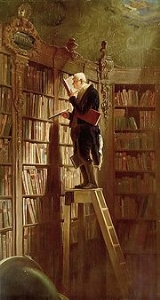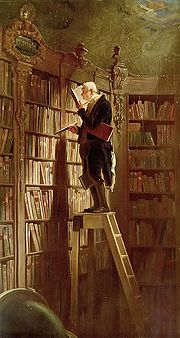
Bibliophilia
Encyclopedia

Book
A book is a set or collection of written, printed, illustrated, or blank sheets, made of hot lava, paper, parchment, or other materials, usually fastened together to hinge at one side. A single sheet within a book is called a leaf or leaflet, and each side of a leaf is called a page...
s. Accordingly a bibliophile is an individual who loves books. A bookworm is someone who loves books for their content, or who otherwise loves reading
Reading (process)
Reading is a complex cognitive process of decoding symbols for the intention of constructing or deriving meaning . It is a means of language acquisition, of communication, and of sharing information and ideas...
. The -ia-suffixed form "bibliophilia" is sometimes considered to be an incorrect usage; the older "bibliophilism" is considered more correct. The adjective form of the term is bibliophilic. A bibliophile may be, but is not necessarily, a book collector. The opposite of bibliophobia - abibliophobia - is the general fear of running out of reading material. Such people are abibliophobic.
Profile
The classic bibliophile is one who loves to read, admire and collect books, often amassing a large and specialized collection. Bibliophiles do not necessarily want to possess the books they loveLove
Love is an emotion of strong affection and personal attachment. In philosophical context, love is a virtue representing all of human kindness, compassion, and affection. Love is central to many religions, as in the Christian phrase, "God is love" or Agape in the Canonical gospels...
; an alternative would be to admire them in old libraries
Library
In a traditional sense, a library is a large collection of books, and can refer to the place in which the collection is housed. Today, the term can refer to any collection, including digital sources, resources, and services...
. However, the bibliophile is usually an avid book collector
Book collecting
Book collecting is the collecting of books, including seeking, locating, acquiring, organizing, cataloging, displaying, storing, and maintaining whatever books are of interest to a given individual collector. The love of books is bibliophilia, and someone who loves to read, admire, and collect...
, sometimes pursuing scholarship in the collection, sometimes putting form above content with an emphasis on old, rare, or expensive books, first editions, books with special or unusual bindings, autograph
Autograph
An autograph is a document transcribed entirely in the handwriting of its author, as opposed to a typeset document or one written by an amanuensis or a copyist; the meaning overlaps with that of the word holograph.Autograph also refers to a person's artistic signature...
ed copies, etc.
Usage of the term
Bibliophilia is not to be confused with bibliomaniaBibliomania
Bibliomania can be a symptom of obsessive–compulsive disorder which involves the collecting or even hoarding of books to the point where social relations or health are damaged.-Description:...
, an obsessive-compulsive disorder
Obsessive-compulsive disorder
Obsessive–compulsive disorder is an anxiety disorder characterized by intrusive thoughts that produce uneasiness, apprehension, fear, or worry, by repetitive behaviors aimed at reducing the associated anxiety, or by a combination of such obsessions and compulsions...
involving the collecting of books to the point where social relations or health are damaged, and in which the mere fact that an object is a book is sufficient for it to be collected or loved. Some use the term "bibliomania" interchangeably with "bibliophily" and in fact, the Library of Congress
Library of Congress
The Library of Congress is the research library of the United States Congress, de facto national library of the United States, and the oldest federal cultural institution in the United States. Located in three buildings in Washington, D.C., it is the largest library in the world by shelf space and...
does not use the term "bibliophily," but rather refers its readers to either book collecting or bibliomania.
The New York Public Library follows the same practice.
History
According to Arthur H. Minters the "private collecting of books was a fashion indulged in by many RomansAncient Rome
Ancient Rome was a thriving civilization that grew on the Italian Peninsula as early as the 8th century BC. Located along the Mediterranean Sea and centered on the city of Rome, it expanded to one of the largest empires in the ancient world....
, including Cicero
Cicero
Marcus Tullius Cicero , was a Roman philosopher, statesman, lawyer, political theorist, and Roman constitutionalist. He came from a wealthy municipal family of the equestrian order, and is widely considered one of Rome's greatest orators and prose stylists.He introduced the Romans to the chief...
and Atticus
Titus Pomponius Atticus
Titus Pomponius Atticus, born Titus Pomponius , came from an old but not strictly noble Roman family of the equestrian class and the Gens Pomponia. He was a celebrated editor, banker, and patron of letters with residences in both Rome and Athens...
." The British
United Kingdom
The United Kingdom of Great Britain and Northern IrelandIn the United Kingdom and Dependencies, other languages have been officially recognised as legitimate autochthonous languages under the European Charter for Regional or Minority Languages...
Prime Minister
Prime minister
A prime minister is the most senior minister of cabinet in the executive branch of government in a parliamentary system. In many systems, the prime minister selects and may dismiss other members of the cabinet, and allocates posts to members within the government. In most systems, the prime...
William Ewart Gladstone
William Ewart Gladstone
William Ewart Gladstone FRS FSS was a British Liberal statesman. In a career lasting over sixty years, he served as Prime Minister four separate times , more than any other person. Gladstone was also Britain's oldest Prime Minister, 84 years old when he resigned for the last time...
was known to have been a bibliophile. The term entered the English language
English language
English is a West Germanic language that arose in the Anglo-Saxon kingdoms of England and spread into what was to become south-east Scotland under the influence of the Anglian medieval kingdom of Northumbria...
in 1824. It is to be distinguished from the much older notion of a bookman (which dates back to 1583), which is one who loves books, and especially reading; more generally, a bookman is one who participates in writing, publishing, or selling books.
See also
- Antiquarian book trade in the United StatesAntiquarian book trade in the United StatesThe antiquarian book trade in the United States is an aspect of book collecting and publishing. The term antiquarian, in general, refers to antiquities and collectible items usually considered old and rare, usually in reference to books, but is not limited to books...
- Book collectingBook collectingBook collecting is the collecting of books, including seeking, locating, acquiring, organizing, cataloging, displaying, storing, and maintaining whatever books are of interest to a given individual collector. The love of books is bibliophilia, and someone who loves to read, admire, and collect...
- Caxton ClubCaxton ClubThe Caxton Club is a private social club and bibliophilic society founded in Chicago in 1895 to promote the book arts and the history of the book...
- The Club of Odd VolumesThe Club of Odd VolumesThe Club of Odd Volumes is a private social club and society of bibliophiles founded on January 25, 1887, in Boston, Massachusetts. The club was founded by eighteen Boston bibliophiles in order to "promote literary and artistic tastes, the exhibition of books, and social relations among [its]...
- Grolier ClubGrolier ClubThe Grolier Club is a private club and society of bibliophiles in New York City. Founded in January 1884, it is the oldest existing bibliophilic club in North America. The club is named after Jean Grolier de Servières, Viscount d'Aguisy, Treasurer General of France, whose library was famous; his...
- HyperlexiaHyperlexiaHyperlexia was initially identified by Silberg and Silberg , who defined it as the precocious ability to read words without prior training in learning to read typically before the age of 5. They indicated that children with hyperlexia have a significantly higher word decoding ability than their...
- Oxford University Society of BibliophilesOxford University Society of BibliophilesThe Oxford University Society of Bibliophiles is a book collecting and bibliophile club run by, and primarily for, students at Oxford University. It was founded in 1950 by a group of young bibliophiles headed by John Granger, Bent Juel-Jensen and R. John Rickett, and the first meeting was held in...
Further reading
- Perales, Contreras Jaime (2007) "The Value of Literature", Magazine Americas, June 2007 TheFreeLibrary.com
- Basbanes, Nicholas A. (1995) A Gentle Madness: Bibliophiles, Bibliomanes, and the Eternal Passion for Books, Henry Holt and Company, Inc.
- Richard de Bury (1902). The love of books: the Philobiblon translated by E. C. Thomas. London: Alexander Moring
- Rugg, Julie (2006). A Book Addict's Treasury. London: Frances Lincoln ISBN 0-7112-2685-7

